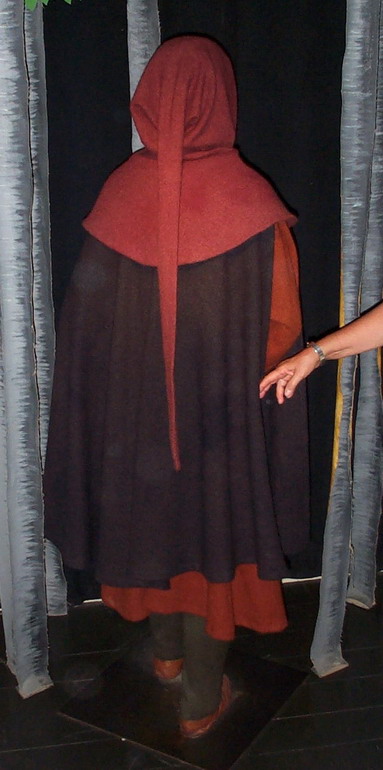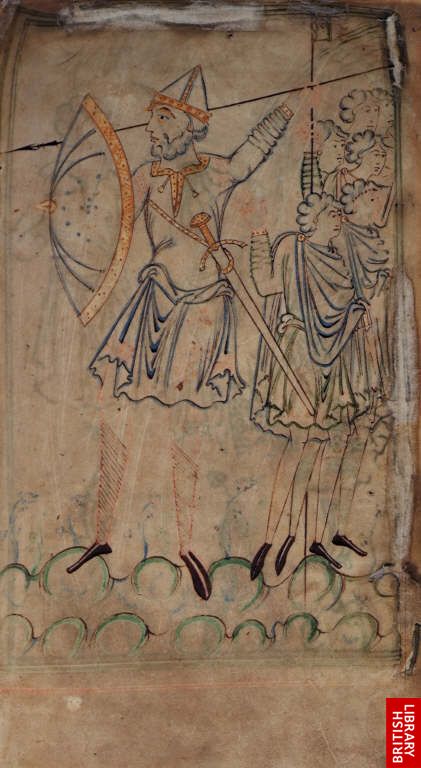Very nice, Patrick. I like the two-tone hose. Don't know if it's period or not but looks good. Clothes are such an interesting element in the historical picture. Liked your pics from the medieval faire too. I just have this image of you walking up to a driver's window on patrol in that gear and saying 'Licence and Coat of Arms please sir......... Our computer shows you should have renewed your feudal tithes 13 days ago sir...please step out of the vehicle'.
On a serious point (and looking at Patrick's outfit), have people on the site researched colours in middle ages garments or want to discuss it ? It's a subject of interest to me. It always struck me that whereas you might think colour dying was primitive at that time, paintings and other illustrative art show a plethra of fantastic bright colours. I had a conversation a few years back on this subject with my mother's best friend who was (now retired) the curator of the medieval section of the British Museum and she said that the art representations from the 14th century onwards may have benefited from the new range of paint colours originating from the Islamic world, born largely through accidental results from alchemist experiments apparently, but that those colours whilst being available to painters weren't necessarily available to dyers. In the same way that tapestry colours from earlier periods may have been achievable in limited thread at great expense but not for clothing, i.e. you could get a limited and vivid blue via indigo but for clothes only a less intense blue via woad-based dye. This makes sense to me as I know the Romans used shellfish to produce their aristocratic purple and saffron to produce yellow but these dyes were very expensive, so bright colours for normal dress might not have been available.. So I wonder about the types of colour available in costume from the norman period onwards. I have found difficulty in finding good books/info on this so any ideas or things people have read would be helpful.
Daniel
Thanks Daniel!
I've thought of those kinds of scenarios too. Unfortunately at this point my coworkers probably wouldn't be surprised!
One of the problems with portraying this particular era is that evidence is so fragmentary. We could have an endless debate on what form the hauberk took in this period, whether a gambeson was worn beneath it, etc. Most available period artwork doesn't portray bi-colored hose like this. On the other hand logic dictates that if they could make hose out of more than one color they very well could have made one pair out of two colors. The Bayeaux Tapestry is most often used as a source of credibility for all things norman. Unfortunately the tapestry itself is far from correct in many areas, with milites wearing red and green mail riding blue horses, etc. The fact that it's been repaired several times over it's long history is another problem.
With something like the hose it boils down to making a decision on how closely you want to adhere to the original sources, which are debatable in themselves, and how far you want to step over the "it could have happened" line. In terms of available colors I suspect that the truth is probably somewhere in the middle ground. They may not have been wearing indigo blue and neon red, but on the other hand I don't think everyone was walking around in undyed burlap either. With things like this particular kit I try to go for the 'plausible yet stylish' look. Perhaps a bit more prosperous than the average guy but still within the realm of possibility. Afterall, I have no desire to look like a peasant. :D
I've thought of those kinds of scenarios too. Unfortunately at this point my coworkers probably wouldn't be surprised!
One of the problems with portraying this particular era is that evidence is so fragmentary. We could have an endless debate on what form the hauberk took in this period, whether a gambeson was worn beneath it, etc. Most available period artwork doesn't portray bi-colored hose like this. On the other hand logic dictates that if they could make hose out of more than one color they very well could have made one pair out of two colors. The Bayeaux Tapestry is most often used as a source of credibility for all things norman. Unfortunately the tapestry itself is far from correct in many areas, with milites wearing red and green mail riding blue horses, etc. The fact that it's been repaired several times over it's long history is another problem.
With something like the hose it boils down to making a decision on how closely you want to adhere to the original sources, which are debatable in themselves, and how far you want to step over the "it could have happened" line. In terms of available colors I suspect that the truth is probably somewhere in the middle ground. They may not have been wearing indigo blue and neon red, but on the other hand I don't think everyone was walking around in undyed burlap either. With things like this particular kit I try to go for the 'plausible yet stylish' look. Perhaps a bit more prosperous than the average guy but still within the realm of possibility. Afterall, I have no desire to look like a peasant. :D
I've looked a bit at this, but I'm by no means an expert.
The easiest colors to dye is pale yellows and browns.
Red is not as hard as one would think, at least not in northern europe. But the colors available is wine red/ burgundy than clear red;
Kewl:
[ Linked Image ]
Like, out:
[ Linked Image ]
The same goes for greens:
Kewl:
[ Linked Image ]
Like, not kewl
[ Linked Image ]
[/img]
The easiest colors to dye is pale yellows and browns.
Red is not as hard as one would think, at least not in northern europe. But the colors available is wine red/ burgundy than clear red;
Kewl:
[ Linked Image ]
Like, out:
[ Linked Image ]
The same goes for greens:
Kewl:
[ Linked Image ]
Like, not kewl
[ Linked Image ]
[/img]
Agree with all of the above, Patrick. Just interesting to speculate on the colours available in that age. I suppose we'll never know unless someone produces a ground-breaking treatise on medieval vegetable dyes.
I also agree on the reliability of original depictions. I was at a friend's birthday in Paris the other weekend and took the opportunity to visit the Paris museum of the middle ages, which has numerous tapestries and painted panels from the 14th to 15th centuries. Some of them you could look at and say (even with me not being a medieval sword person) I recognise that sword type, or that the tunic/dress portrayed looks very like the fragments in the museum. But yet there were others which while portraying a graphically interesting scene of religious/political significance, the swords or armour portrayed were clearly just there as symols : i.e. they didn''t follow any type I've ever seen and were very 'broad' in their portrayal. So you are tempted to make the same assumptions regarding clothes and their colours. Was the artist trying to portray accurately ? Or was he concentrating on the message not the detail? And were the colours available to the artist also available to the dyer? Not all artists probably had the same intention and not all pictures the same reliability.
Great museum (the Paris middle ages museum, in one of the original crusading 'hotels'), by the way, in terms of pictorial art . Only one room of arms and armour but one beautiful single handed 14th century sword there (remounted in 15th century recall from the card) in immaculate condition. Don't ask me for type because you guys will completely lose me in your Oak -Smoked Type LXII , sub-para (2) , line 3 typology!! I only understand types from 16th century onwards! Looked rather like one of the ones Albion makes : Sovereign ??? short wide blade, mulitiple fullered, upturned quillons hilt long enough so you could hand-half if necessary.
Daniel
I also agree on the reliability of original depictions. I was at a friend's birthday in Paris the other weekend and took the opportunity to visit the Paris museum of the middle ages, which has numerous tapestries and painted panels from the 14th to 15th centuries. Some of them you could look at and say (even with me not being a medieval sword person) I recognise that sword type, or that the tunic/dress portrayed looks very like the fragments in the museum. But yet there were others which while portraying a graphically interesting scene of religious/political significance, the swords or armour portrayed were clearly just there as symols : i.e. they didn''t follow any type I've ever seen and were very 'broad' in their portrayal. So you are tempted to make the same assumptions regarding clothes and their colours. Was the artist trying to portray accurately ? Or was he concentrating on the message not the detail? And were the colours available to the artist also available to the dyer? Not all artists probably had the same intention and not all pictures the same reliability.
Great museum (the Paris middle ages museum, in one of the original crusading 'hotels'), by the way, in terms of pictorial art . Only one room of arms and armour but one beautiful single handed 14th century sword there (remounted in 15th century recall from the card) in immaculate condition. Don't ask me for type because you guys will completely lose me in your Oak -Smoked Type LXII , sub-para (2) , line 3 typology!! I only understand types from 16th century onwards! Looked rather like one of the ones Albion makes : Sovereign ??? short wide blade, mulitiple fullered, upturned quillons hilt long enough so you could hand-half if necessary.
Daniel
A pretty neat site, with archeological/preserved finds of clothing...
http://www.personal.utulsa.edu/~marc-carlson/cloth/bockhome.html
The most common tunic for reenactors is the Nockert Type A, in varying lengths...
http://www.personal.utulsa.edu/~marc-carlson/cloth/type1.html
http://www.personal.utulsa.edu/~marc-carlson/cloth/bockhome.html
The most common tunic for reenactors is the Nockert Type A, in varying lengths...
http://www.personal.utulsa.edu/~marc-carlson/cloth/type1.html
Thanks Elling, that's a really interesting site.
Daniel
Daniel
I can see they have The Bocksten Bog Man on that last link,
I was there in Varberg Fortress on a market they did have this last weekend,
and i take a pic of from rear end off that doll they have dressed up, those other pic i take was a mess,
well! always something :)
 Attachment: 71.39 KB
Attachment: 71.39 KB

The Bocksten Bog Man
I was there in Varberg Fortress on a market they did have this last weekend,
and i take a pic of from rear end off that doll they have dressed up, those other pic i take was a mess,
well! always something :)

The Bocksten Bog Man
Got a bunch of pictures from a friend the other day, amongst them a picture of Goliath, from a ca 1065 manuscript...
Short tunic, hose with wrappings, embrodiered edges...
 Attachment: 61.1 KB
Attachment: 61.1 KB

Short tunic, hose with wrappings, embrodiered edges...

Page 2 of 2
You cannot post new topics in this forumYou cannot reply to topics in this forum
You cannot edit your posts in this forum
You cannot delete your posts in this forum
You cannot vote in polls in this forum
You cannot attach files in this forum
You can download files in this forum
All contents © Copyright 2003-2006 myArmoury.com — All rights reserved
Discussion forums powered by phpBB © The phpBB Group
Switch to the Full-featured Version of the forum
Discussion forums powered by phpBB © The phpBB Group
Switch to the Full-featured Version of the forum